35个你不得不学的经典英语句型
- 格式:doc
- 大小:87.00 KB
- 文档页数:8
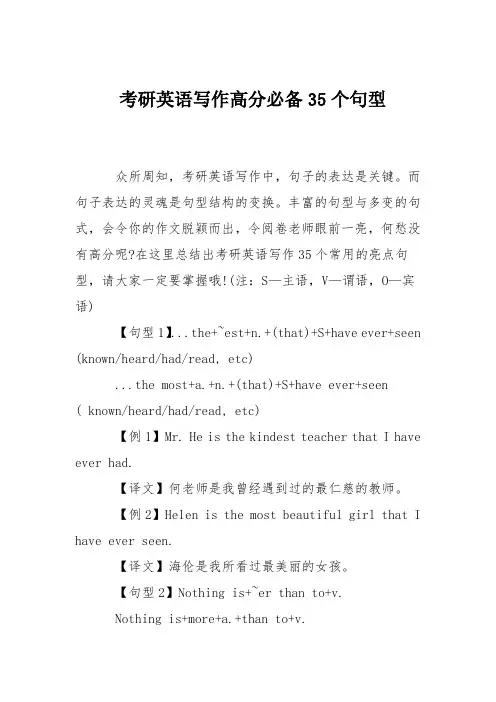
考研英语写作高分必备35个句型众所周知,考研英语写作中,句子的表达是关键。
而句子表达的灵魂是句型结构的变换。
丰富的句型与多变的句式,会令你的作文脱颖而出,令阅卷老师眼前一亮,何愁没有高分呢?在这里总结出考研英语写作35个常用的亮点句型,请大家一定要掌握哦!(注:S—主语,V—谓语,O—宾语)【句型1】...the+~est+n.+(that)+S+have ever+seen (known/heard/had/read, etc)...the most+a.+n.+(that)+S+have ever+seen( known/heard/had/read, etc)【例1】Mr. He is the kindest teacher that I have ever had.【译文】何老师是我曾经遇到过的最仁慈的教师。
【例2】Helen is the most beautiful girl that I have ever seen.【译文】海伦是我所看过最美丽的女孩。
【句型2】Nothing is+~er than to+v.Nothing is+more+a.+than to+v.【例句】Nothing is more important than to receive education.【译文】没有比接受教育更重要的事。
【句型3】...cannot emphasize the importance of ... too much. 再怎么强调……的重要性也不为过【例句】We cannot emphasize the importance of protecting our eyes too much.【译文】我们再怎么强调保护眼睛的重要性也不为过。
【句型4】There is no denying that+S+V 不可否认的……【例句】There is no denying that the qualities of our living have gone from bad to worse.【译文】不可否认,我们的生活品质已经每况愈下。
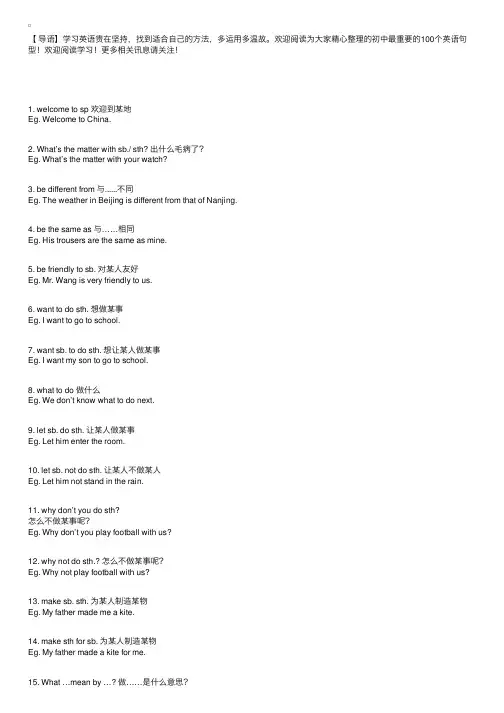
【导语】学习英语贵在坚持,找到适合⾃⼰的⽅法,多运⽤多温故。
欢迎阅读为⼤家精⼼整理的初中最重要的100个英语句型!欢迎阅读学习!更多相关讯息请关注!1. welcome to sp 欢迎到某地Eg. Welcome to China.2. What’s the matter with sb./ sth? 出什么⽑病了?Eg. What’s the matter with your watch?3. be different from 与......不同Eg. The weather in Beijing is different from that of Nanjing.4. be the same as 与……相同Eg. His trousers are the same as mine.5. be friendly to sb. 对某⼈友好Eg. Mr. Wang is very friendly to us.6. want to do sth. 想做某事Eg. I want to go to school.7. want sb. to do sth. 想让某⼈做某事Eg. I want my son to go to school.8. what to do 做什么Eg. We don’t know what to do next.9. let sb. do sth. 让某⼈做某事Eg. Let him enter the room.10. let sb. not do sth. 让某⼈不做某⼈Eg. Let him not stand in the rain.11. why don’t you do sth?怎么不做某事呢?Eg. Why don’t you play football with us?12. why not do sth.? 怎么不做某事呢?Eg. Why not play football with us?13. make sb. sth. 为某⼈制造某物Eg. My father made me a kite.14. make sth for sb. 为某⼈制造某物Eg. My father made a kite for me.15. What …mean by …? 做……是什么意思?Eg. What do you mean by doing that?16. like doing sth. 喜欢做某事Eg. Jim likes swimming.17. like to do sth. 喜欢做某事Eg. He doesn’t like to swim now.18. feel like doing sth. 想做某事Eg. I feel like eating bananas.19. would like to do sth. 愿意做某事Eg. Would you like to go rowing with me?20. would like sb. to do sth. 愿意某⼈做某事Eg. I’d like you to stay with me tonight.21. make sb. do sth. 使某⼈做某事Eg. His brother often makes him stay in the sun.22. let sb. do sth. 让某⼈做某事Eg. Let me sing a song for you.23. have sb. do sth. 使某⼈做某事Eg. You shouldn’t have the students work so hard.24. be far from sp 离某地远Eg. His school is far from his home.25. be near to sp 离某地近Eg. The hospital is near to the post office.26. be good at sth./doing sth. 擅长某事/做某事Eg. We are good at English.They are good at boating.27. It takes sb. some time to do sth. 某⼈花多少时间做某事Eg. It took me more than a year to learn to draw a beautiful horse in five minutes.28. sb. spends some time/money (in )doing sth. 某⼈花多少时间做某事Eg. I spent twenty years in writing the novel.29. sb. spends some time/money on sth. 某事花了某⼈多少时间/⾦钱Eg. Jim spent 1000 yuan on the bike.30. sth. costs sb. some money. 某物花了某⼈多少钱Eg. The bike cost Jim 1000 yuan.31. sb. pays some money for sth. 某⼈为某物付了多少钱Eg. Jim paid 1000 yuan for the bike.32. begin/start with sth. 开始做某事Eg. The started the meeting with a song.33. be going to do sth. 打算做某事Eg. We are going to study in Japan.34. call A B 叫A BEg. They called the village Gumtree.35. thank sb. for sth./doing sth. 感谢某⼈做某事Eg. Thank you for your help.Thank you for helping me.36. What ……for? 为什么Eg. What do you learn English for?37. How/ what about doing sth.?做某事怎么样?Eg. How about going fishing?38. S +be+ the+级+of/in短语Eg. Lucy is the tallest in her class.39. S + be +⽐较级+than any other + n.Eg. Lucy is taller than any other student in her class.40. have to do sth. 不得不做某事Eg. I have to go home now.41. had better do sth. 做某事Eg. You’d better study hard at English.42. had better not do sth. 别做某事Eg. You’d better not stay up.43. help sb. to do sth. 帮助某⼈做某事Eg. Lucy often helps Lily to wash her clothes.44. help sb. do sth. 帮助某⼈做某事Eg. He usually helps me learn English.45. help sb. with sth. 帮助某⼈做某事Eg. I sometimes help my mother with the housework.46. make it +时间把时间定在⼏点Eg. Let’s make it 8:30.47. take sb. to sp 带某⼈到某地Eg. Mr. Wang will take us to the Summer Palace next Sunday.49. have nothing to do (with sb) 与某⼈没有关系Eg. That has nothing to do with me.50. 主语+ don’t think + 从句认为……不……Eg. I don’t think it will rain tomorrow.51. It’s + adj.+ for sb. to do sth. 做某事对某⼈来说怎么样Eg. It is lucky for you to go to London.52. How + adj/ adv + 主+ 谓!多么……啊!Eg. How beautiful the flower is!53. what + a/an + adj + n + 主+ 谓!Eg. What an beautiful flower it is!54. What + adj+ pl./[u] +主+ 谓!Eg. What bad weather it is today!55. find it + adj+ to do sth. 发现做某事如何Eg. I find it hard to speak English well!56. ask sb. for sth. 向某⼈要某物Eg. They often ask me for money.57. need to do sth. 需要做某事Eg. You need to study hard.58. need sth 需要某物Eg. I don’t need your money.59. use A to do B ⽤A来做BEg. We use pens to write.60. show sb. sth 给某⼈看某物Eg. Please show me the map.61. show sth. to sb. 把某物给某⼈看Eg. Please show the map to me.62. pass sb. sth. 把某物递给某⼈Eg. Pass me the cup of tea.63. pass sth. to sb. 把某物递给某⼈Eg. Pass the cup of tea to me.64. buy sb. sth. 为某⼈买某物Eg. Mother bought me a bike.65. buy sth. for sb. 为某⼈买某物Eg. Mother bought a bike for me.66. give sb. sth 把某物给某⼈Eg. Jim gave me an English dictionary.67. give sth. to sb. 把某物给某⼈Eg. Jim gave an English dictionary to me.68. get to sp 达到某地Eg. I got to Beijing on the morning of May 1st.69. arrive at /in sp 达到某地Eg. I arrived in Beijing on the morning of May 1st.70. reach sp 到达某地Eg. I reached Beijing on the morning of May 1st.71. hope to do sth. 希望某⼈做某事Eg. I hope to see you soon.72. there is sth. wrong with sth./sb. 某物/某⼈出什么状况了Eg. There is something wrong my car.73. sth. is wrong with … 某物出什么⽑病了Eg. Something is wrong with my car.74. How do you like sth? 你认为……怎么样?Eg. How do you like Beijing?75.What do you think of sth.? 你认为……怎么样?Eg. What do you think of Beijing?76. start doing sth. 开始做某事Eg. I started learning English in 1983.77. start to do sth. 开始做某事Eg. I started to watch TV after finishing my homework.78.finish doing sth. 完成作某事Eg. I finished cleaning my car just now.79. enjoy doing sth. 喜欢做某事Eg. They all enjoy living and working in China.80.What / when / where / who / something / anything / nothing else …… 别的什么/何时/何地/谁……Eg. What else do you want to buy?Where else have you gone?Who else have you played with?I have nothing else to tell you.Would you like something else?81. forget doing sth. 忘记做过某事了(已做)Eg. I forgot turning off the lights. Look, it is dark in the room.82. forget to do sth. 忘了做某事了(未做)Eg. I forgot to turn off the lights. Could you go back and shut the off?83. remember doing sth. 记得做过某事了(已做)Eg. I remembered returning your money. You are so forgetful.84. remember to do sth. 记住去做某事(未做)Eg. Remember to bring me some money. I’ve run out of it.85.stop to do sth. 停下来去做某事Eg. He stopped to talk with Mary when she enter the office.86. stop doing sth. 停⽌做某事Eg. The students stopped talking when the teachet came in.87. watch/see/hear sb. do sth. 观看/看见/听见某⼈做了某事(全过程)Eg. I saw you pick an apple just now.88. watch/see/hear sb. doing sth. 观看/看见/听见某⼈正在做某事(点动作)Eg. I saw you playing basketball with your classmates on the playground last Sunday.89. go on doing sth. 继续作某事Eg. He went on reading after a short rest.90. go on to do sth. 继续作某事Eg. He went on to read after finishing wash the dishes.91. go on with sth. 继续某事Eg. He went on with his work after a short rest.92. say hello/goodbye to sb. 向某⼈告别Eg.I came to say good-bye to you.93. be busy doing sth. 忙于做某事Eg. They are busy planting trees on the hill.94. be interested in sth. 对某事感兴趣Eg. English is very interesting. We are all interested in it.95. tell sb. to do sth. 告诉某⼈做某事Eg. Mother told me to go shopping with her.96. ask sb. to do sth. 让某⼈做某事Eg. Jim ask me to go rowing with him.97. call/ring sb. up 给某⼈打电话Eg. I will call you up tommow.98. be ready to do sth. 准备做某事Eg. We are ready to have lunch.99. go doing sth. 去做某事Eg. Let’s go fishing.100. prefer A/doing A to B/doing B ⽐起A/做A,更喜欢B/做B Eg. Lucy prefers English to French.I prefer staying at home to going to the cinema.。

高中英语必备基础句型进入高中阶段,英语的学习再也不是陪衬,它的作用大家都应该清楚。
作为三大主科之一,分值大,考察范围广,这是众所皆知的。
那么在高中学习中有哪些必备的英语基础句型呢?如果你不了解?如果你也想学习,就一起往下看看吧!句型1:There+be +主语+地点状语/ 时间状语There're three books on the table.桌子上有三本书。
句型2:What's wrong with+sb./sth.?What's wrong with your telephone?你的手机有什么毛病?句型3:How do you like…?How do you like China?你觉得中国怎么样?句型4:What do you like about…?What do you like about China?你喜欢中国的什么?句型5:had better(not)+动词原形You'd better ask that policeman over there.你最好去问问那边的那个警察。
句型7:Thank+sb.+for (doing) sth.Thank you for coming to see me.感谢你来看我。
句型8:So+be/情态动词/助动词+主语He is a student. So am I.他是一个学生,我也是。
句型9:not…until…He didn't have supper until his parents came back.直到他的父母回来他才吃饭。
句型10:比较级十and+比较级The baby cried harder and harder.那孩子哭得越来越厉害。
句型11:the+比较级,the+比较级The more one has,the more one wants.拥有的越多,想要的越多。
句型12:…as+adj./adv.+as……not as(so)+adj./adv.+as…Last Sunday the weather was not so wet as it is today.上个星期天的天气不如今天的天气潮湿。
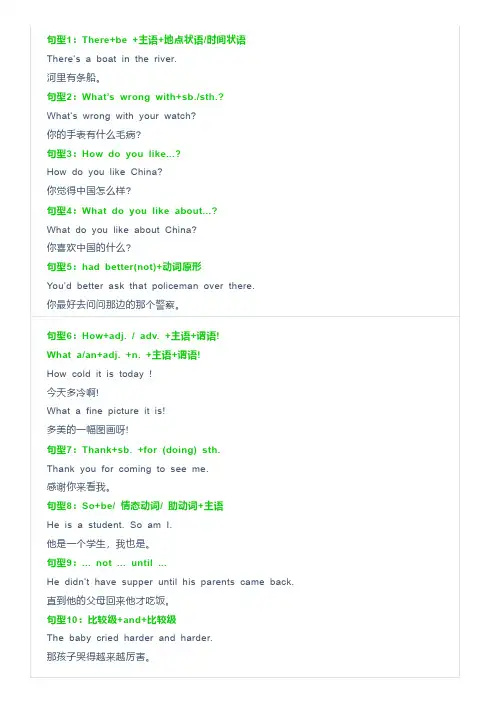
句型1:There+be +主语+地点状语/时间状语 There’s a boat in the river. 河里有条船。
句型2:What’s wrong with+sb./sth.? What’s wrong with your watch? 你的手表有什么毛病? 句型3:How do you like...? How do you like China? 你觉得中国怎么样? 句型4:What do you like about...? What do you like about China?你喜欢中国的什么? 句型5:had better(not)+动词原形 You’d better ask that policeman over there. 你最好去问问那边的那个警察。
句型6:How+adj. / adv. +主语+谓语! What a/an+adj. +n. +主语+谓语! How cold it is today ! 今天多冷啊! What a fine picture it is! 多美的一幅图画呀! 句型7:Thank+sb. +for (doing) sth.Thank you for coming to see me. 感谢你来看我。
句型8:So+be/ 情态动词/ 助动词+主语 He is a student. So am I. 他是一个学生,我也是。
句型9:... not ... until ... He didn’t have supper until his parents came back. 直到他的父母回来他才吃饭。
句型10:比较级+and+比较级 The baby cried harder and harder. 那孩子哭得越来越厉害。
句型11:the +比较级,the +比较级 The more one has,the more one wants. 越有越贪。
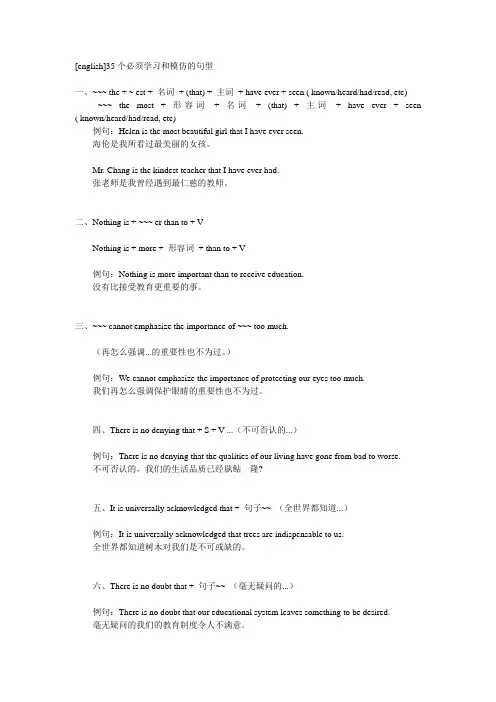
[english]35个必须学习和模仿的句型一、~~~ the + ~ est + 名词+ (that) + 主词+ have ever + seen ( known/heard/had/read, etc)~~~ the most + 形容词+ 名词+ (that) + 主词+ have ever + seen ( known/heard/had/read, etc)例句:Helen is the most beautiful girl that I have ever seen.海伦是我所看过最美丽的女孩。
Mr. Chang is the kindest teacher that I have ever had.张老师是我曾经遇到最仁慈的教师。
二、Nothing is + ~~~ er than to + VNothing is + more + 形容词+ than to + V例句:Nothing is more important than to receive education.没有比接受教育更重要的事。
三、~~~ cannot emphasize the importance of ~~~ too much.(再怎么强调...的重要性也不为过。
)例句:We cannot emphasize the importance of protecting our eyes too much.我们再怎么强调保护眼睛的重要性也不为过。
四、There is no denying that + S + V ...(不可否认的...)例句:There is no denying that the qualities of our living have gone from bad to worse.不可否认的,我们的生活品质已经肒鲇 隆?五、It is universally acknowledged that + 句子~~ (全世界都知道...)例句:It is universally acknowledged that trees are indispensable to us.全世界都知道树木对我们是不可或缺的。
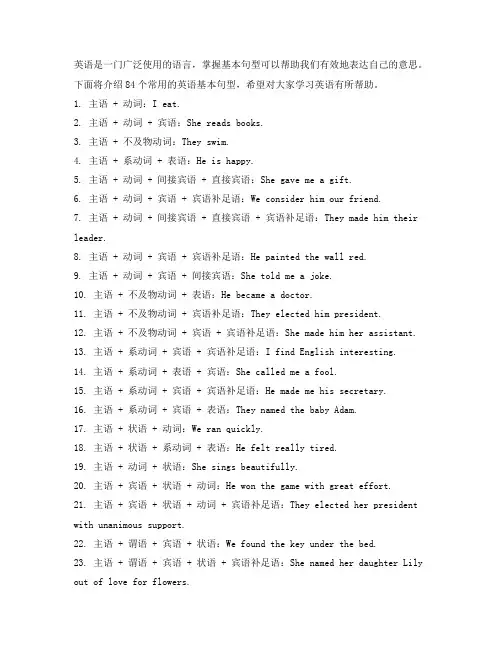
英语是一门广泛使用的语言,掌握基本句型可以帮助我们有效地表达自己的意思。
下面将介绍84个常用的英语基本句型,希望对大家学习英语有所帮助。
1. 主语 + 动词:I eat.2. 主语 + 动词 + 宾语:She reads books.3. 主语 + 不及物动词:They swim.4. 主语 + 系动词 + 表语:He is happy.5. 主语 + 动词 + 间接宾语 + 直接宾语:She gave me a gift.6. 主语 + 动词 + 宾语 + 宾语补足语:We consider him our friend.7. 主语 + 动词 + 间接宾语 + 直接宾语 + 宾语补足语:They made him their leader.8. 主语 + 动词 + 宾语 + 宾语补足语:He painted the wall red.9. 主语 + 动词 + 宾语 + 间接宾语:She told me a joke.10. 主语 + 不及物动词 + 表语:He became a doctor.11. 主语 + 不及物动词 + 宾语补足语:They elected him president.12. 主语 + 不及物动词 + 宾语 + 宾语补足语:She made him her assistant.13. 主语 + 系动词 + 宾语 + 宾语补足语:I find English interesting.14. 主语 + 系动词 + 表语 + 宾语:She called me a fool.15. 主语 + 系动词 + 宾语 + 宾语补足语:He made me his secretary.16. 主语 + 系动词 + 宾语 + 表语:They named the baby Adam.17. 主语 + 状语 + 动词:We ran quickly.18. 主语 + 状语 + 系动词 + 表语:He felt really tired.19. 主语 + 动词 + 状语:She sings beautifully.20. 主语 + 宾语 + 状语 + 动词:He won the game with great effort.21. 主语 + 宾语 + 状语 + 动词 + 宾语补足语:They elected her president with unanimous support.22. 主语 + 谓语 + 宾语 + 状语:We found the key under the bed.23. 主语 + 谓语 + 宾语 + 状语 + 宾语补足语:She named her daughter Lily out of love for flowers.24. 主语 + 谓语 + 不定式:They want to play.25. 主语 + 谓语 + 动词 + 不定式:He can swim.26. 主语 + 谓语 + 宾语 + 动词 + 不定式:She asked me to help.27. 主语 + 谓语 + 不定式 + 宾语补足语:We believe him to be honest.28. 主语 + 谓语 + 宾语 + 不定式 + 宾语补足语:He wants me to be his assistant.29. 主语 + 谓语 + 不定式 + 状语:You need to study hard.30. 主语 + 谓语 + 动名词:She enjoys swimming.31. 主语 + 谓语 + 宾语 + 动名词:They appreciate her singing.32. 主语 + 谓语 + 动名词 + 宾语补足语:I consider cooking an art.33. 主语 + 谓语 + 不定式 + 动名词:He started to learn painting.34. 主语 + 谓语 + 宾语 + 不定式 + 动名词:She saw him come in.35. 主语 + 谓语 + 宾语 + 不定式 + 状语:We made them stay longer.36. 主语 + 谓语 + 不定式 + 宾语补足语 + 动名词:He wants us to help him finish the project.37. 主语 + 谓语 + 不定式 + 宾语补足语 + 状语:I expect you to arrive on time.38. 主语 + 谓语 + 不定式 + 动名词 + 状语:They will try to solve the problem by working together.39. 主语 + 谓语 + 宾语 + 不定式 + 宾语补足语 + 状语:She persuaded him to stay after school for extra practice.40. 主语 + 谓语 + 分词:He looked tired.41. 主语 + 谓语 + 宾语 + 分词:They found the book interesting.42. 主语 + 谓语 + 分词 + 宾语补足语:We consider him qualified for the job.43. 主语 + 谓语 + 不定式 + 分词:She decided to leave quickly.44. 主语 + 谓语 + 宾语 + 不定式 + 分词:He heard her sing beautifully.45. 主语 + 谓语 + 分词 + 状语:They sat there, waiting for the bus.46. 主语 + 谓语 + 宾语 + 分词 + 状语:We saw her boarding the train.47. 主语 + 谓语 + 分词 + 宾语补足语 + 状语:He walked away, satisfied with his achievement.48. 主语 + 谓语 + 分词 + 不定式:She came running to me to ask a question.49. 主语 + 谓语 + 宾语 + 分词 + 不定式:They saw him standing alone in the rain.50. 主语 + 谓语 + 分词 + 宾语 + 不定式:We watched the movie, hoping to be entertained.51. 主语 + 谓语 + 不定式 + 分词 + 宾语补足语:He wants us to stay focused on our goals.52. 主语 + 谓语 + 不定式 + 分词 + 状语:She needs to finish her homework before going out.53. 主语 + 谓语 + 宾语 + 不定式 + 分词 + 状语:They made him work extra hours to meet the deadline.54. 主语 + 谓语 + 不定式 + 分词 + 宾语补足语:We believe you to have the ability to succeed.55. 主语 + 谓语 + 不定式 + 分词 + 宾语补足语 + 状语:He considered it a great honor to be chosen as the team captain.56. 主语 + 谓语 + 分词 + 状语 + 宾语:They finished the task, exhausted.57. 主语 + 谓语 + 宾语 + 分词 + 状语 + 宾语补足语:She found him standing there, helpless.58. 主语 + 谓语 + 分词 + 宾语 + 状语:He left the room, closing the door behind him.59. 主语 + 谓语 + 分词 + 宾语 + 宾语补足语:We saw her painting the wall red.60. 主语 + 谓语 + 宾语 + 分词 + 宾语补足语 + 状语:They heard him singing in the shower, beautifully.61. 主语 + 谓语 + 分词 + 不定式 + 状语:She stood there, not knowing what to say.62. 主语 + 谓语 + 宾语 + 分词 + 不定式 + 状语:He caught her reading his diary, secretly.63. 主语 + 谓语 + 分词 + 宾语 + 不定式 + 状语:They watched the kids playing happily in the park.64. 主语 + 谓语 + 不定式 + 分词 + 状语 + 宾语补足语:We want you to come prepared for the meeting.65. 主语 + 谓语 + 不定式 + 分词 + 宾语 + 状语:She asked me to stay quiet, not attracting attention.66. 主语 + 谓语 + 分词 + 状语 + 宾语 + 宾语补足语:They arrived at the party late, all dressed up.67. 主语 + 谓语 + 分词 + 宾语 + 状语 + 宾语补足语:I left the office, feeling satisfied with my performance.68. 主语 + 谓语 + 分词 + 宾语 + 宾语补足语 + 状语:He walked away, looking disappointed.69. 主语 + 谓语 + 不定式 + 宾语 + 分词:She wants us to keep the door closed, protecting the animals inside.70. 主语 + 谓语 + 不定式 + 状语 + 分词:They need to finish the project, no matter how hard it is.71. 主语 + 谓语 + 不定式 + 宾语 + 分词 + 状语:We would like you to come over for dinner, if you are available.72. 主语 + 谓语 + 不定式 + 分词 + 状语 + 宾语补足语:He decided to work harder, hoping to achieve better results.73. 主语 + 谓语 + 不定式 + 分词 + 宾语补足语 + 状语:She wanted him to leave, regardless of his apology.74. 主语 + 谓语 + 分词 + 宾语 + 不定式:They saw him running down the street to catch the bus.75. 主语 + 谓语 + 分词 + 不定式 + 宾语:He felt someone touch his shoulder, turning around to see who it was.76. 主语 + 谓语 + 分词 + 宾语 + 不定式 + 宾语补足语:She caught her sister eating her chocolate cake, scolding her for the theft.77. 主语 + 谓语 + 不定式 + 分词 + 宾语 + 状语:They asked me to speak louder, not being able to hear me clearly.78. 主语 + 谓语 + 不定式 + 分词 + 状语 + 宾语补足语:We advised him to approach the problem from a different angle, with the hope of finding a solution.79. 主语 + 谓语 + 不定式 + 宾语 + 分词 + 宾语补足语 + 状语:She reminded him to take his medicine, not forgetting his doctor's advice.80. 主语 + 谓语 + 不定式 + 分词 + 宾语 + 状语 + 宾语补足语:He urged them to apply for the position, fully aware of their qualifications. 81. 主语 + 谓语 + 分词 + 不定式 + 状语 + 宾语 + 宾语补足语:They watched the news report excitedly, hoping to see their favorite celebrity mentioned.82. 主语 + 谓语 + 分词 + 不定式 + 宾语 + 宾语补足语 + 状语:She left the room angrily, slamming the door shut.83. 主语 + 谓语 + 不定式 + 分词 + 状语 + 宾语 + 宾语补足语:We told him to study hard, not wasting his potential.84. 主语 + 谓语 + 不定式 + 分词 + 宾语 + 状语 + 宾语补足语:He encouraged her to believe in herself, never doubting her abilities.这些基本句型涵盖了常见的英语句子结构,掌握它们可以帮助你更好地表达自己的思想和意图。
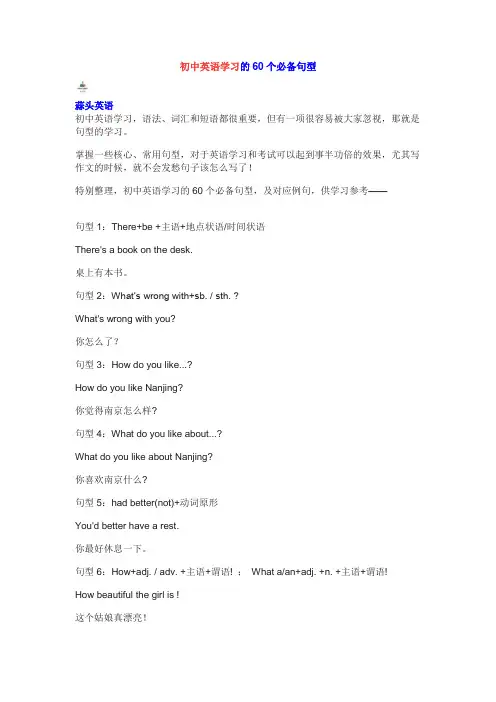
初中英语学习的60个必备句型蒜头英语初中英语学习,语法、词汇和短语都很重要,但有一项很容易被大家忽视,那就是句型的学习。
掌握一些核心、常用句型,对于英语学习和考试可以起到事半功倍的效果,尤其写作文的时候,就不会发愁句子该怎么写了!特别整理,初中英语学习的60个必备句型,及对应例句,供学习参考——句型1:There+be +主语+地点状语/时间状语There's a book on the desk.桌上有本书。
句型2:What’s wrong with+sb. / sth. ?What's wrong with you?你怎么了?句型3:How do you like...?How do you like Nanjing?你觉得南京怎么样?句型4:What do you like about...?What do you like about Nanjing?你喜欢南京什么?句型5:had better(not)+动词原形You'd better have a rest.你最好休息一下。
句型6:How+adj. / adv. +主语+谓语! ;What a/an+adj. +n. +主语+谓语!How beautiful the girl is !这个姑娘真漂亮!What an interesting book it is!多有趣的一本书呀!句型7:Thank+sb. +for (doing) sth.Thank you for helping me.感谢你帮我。
句型8:So+be/ 情态动词/ 助动词+主语He is a doctor. So am I.他是一个医生,我也是。
句型9:... not ... until ...He didn't do his homework until his mother came back.直到他的父母回来他才写作业。
句型10:比较级+and+比较级It rained harder and harder.雨越下越大。
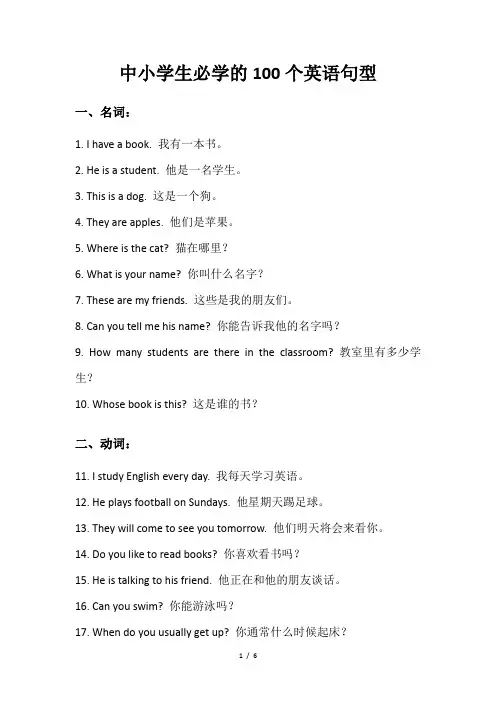
中小学生必学的100个英语句型一、名词:1. I have a book. 我有一本书。
2. He is a student. 他是一名学生。
3. This is a dog. 这是一个狗。
4. They are apples. 他们是苹果。
5. Where is the cat? 猫在哪里?6. What is your name? 你叫什么名字?7. These are my friends. 这些是我的朋友们。
8. Can you tell me his name? 你能告诉我他的名字吗?9. How many students are there in the classroom? 教室里有多少学生?10. Whose book is this? 这是谁的书?二、动词:11. I study English every day. 我每天学习英语。
12. He plays football on Sundays. 他星期天踢足球。
13. They will come to see you tomorrow. 他们明天将会来看你。
14. Do you like to read books? 你喜欢看书吗?15. He is talking to his friend. 他正在和他的朋友谈话。
16. Can you swim? 你能游泳吗?17. When do you usually get up? 你通常什么时候起床?18. How do you go to school? 你怎样去上学?19. They are playing in the garden. 他们在花园里玩。
20. Let’s go and see the film. 让我们去看电影吧。
三、形容词:21. She is beautiful. 她很漂亮。
22. The book is interesting. 这本书很有趣。
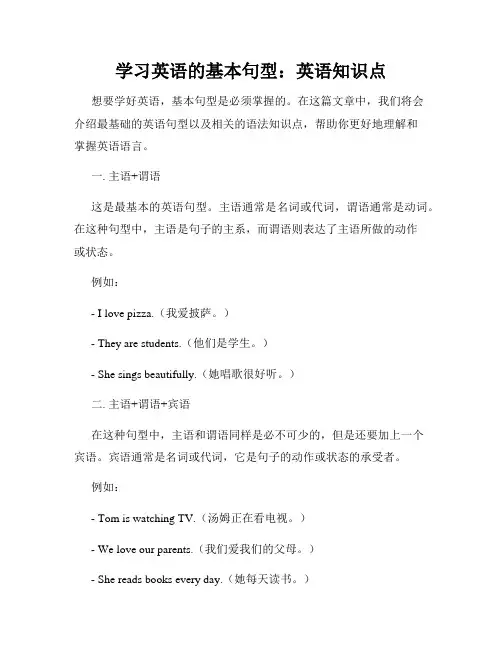
学习英语的基本句型:英语知识点想要学好英语,基本句型是必须掌握的。
在这篇文章中,我们将会介绍最基础的英语句型以及相关的语法知识点,帮助你更好地理解和掌握英语语言。
一. 主语+谓语这是最基本的英语句型。
主语通常是名词或代词,谓语通常是动词。
在这种句型中,主语是句子的主系,而谓语则表达了主语所做的动作或状态。
例如:- I love pizza.(我爱披萨。
)- They are students.(他们是学生。
)- She sings beautifully.(她唱歌很好听。
)二. 主语+谓语+宾语在这种句型中,主语和谓语同样是必不可少的,但是还要加上一个宾语。
宾语通常是名词或代词,它是句子的动作或状态的承受者。
例如:- Tom is watching TV.(汤姆正在看电视。
)- We love our parents.(我们爱我们的父母。
)- She reads books every day.(她每天读书。
)三. 主语+谓语+宾语+宾补在这种句型中,宾语后面跟着宾语补足语,它通常是形容词或名词。
宾语补足语补充了关于宾语的信息,使句子更加丰富。
例如:- The doctor found the patient healthy.(医生认为这个患者健康。
)- He painted his room blue.(他涂了他的房间蓝色。
)- She finds the job interesting.(她觉得这份工作很有趣。
)四. 主语+动词+间接宾语+直接宾语在这种句型中,动词需要同时指向间接宾语和直接宾语。
间接宾语接收行动的目标,而直接宾语受到行动的影响。
例如:- She gave me a book.(她送给我一本书。
)- He told her a joke.(他给她讲了一个笑话。
)- They bought their mom a gift.(他们给他们的妈妈买了一个礼物。
)五. 主语+系动词+表语在这种句型中,谓语是系动词,它建立了主语与表语之间的联系。
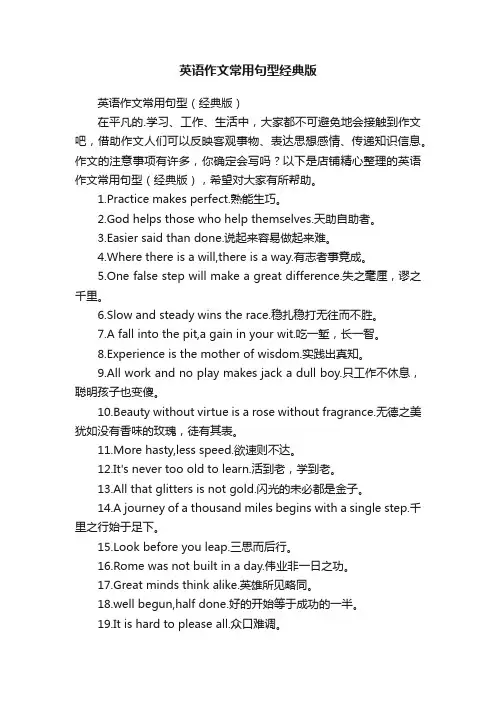
英语作文常用句型经典版英语作文常用句型(经典版)在平凡的.学习、工作、生活中,大家都不可避免地会接触到作文吧,借助作文人们可以反映客观事物、表达思想感情、传递知识信息。
作文的注意事项有许多,你确定会写吗?以下是店铺精心整理的英语作文常用句型(经典版),希望对大家有所帮助。
1.Practice makes perfect.熟能生巧。
2.God helps those who help themselves.天助自助者。
3.Easier said than done.说起来容易做起来难。
4.Where there is a will,there is a way.有志者事竟成。
5.One false step will make a great difference.失之毫厘,谬之千里。
6.Slow and steady wins the race.稳扎稳打无往而不胜。
7.A fall into the pit,a gain in your wit.吃一堑,长一智。
8.Experience is the mother of wisdom.实践出真知。
9.All work and no play makes jack a dull boy.只工作不休息,聪明孩子也变傻。
10.Beauty without virtue is a rose without fragrance.无德之美犹如没有香味的玫瑰,徒有其表。
11.More hasty,less speed.欲速则不达。
12.It's never too old to learn.活到老,学到老。
13.All that glitters is not gold.闪光的未必都是金子。
14.A journey of a thousand miles begins with a single step.千里之行始于足下。
15.Look before you leap.三思而后行。
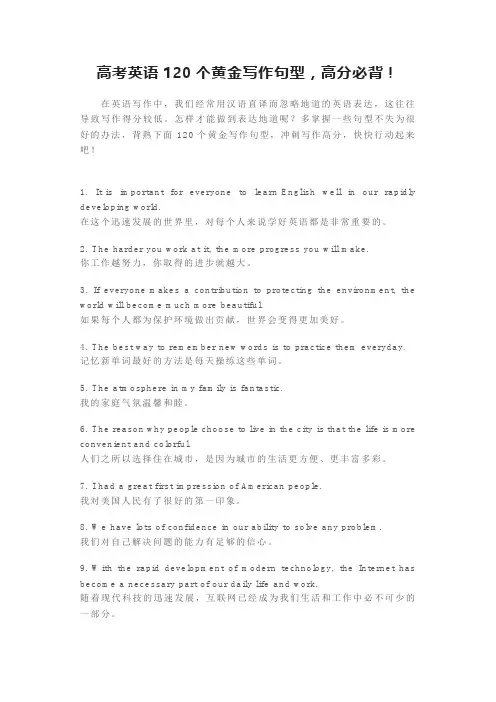
高考英语120个黄金写作句型,高分必背!在英语写作中,我们经常用汉语直译而忽略地道的英语表达,这往往导致写作得分较低。
怎样才能做到表达地道呢?多掌握一些句型不失为很好的办法,背熟下面120个黄金写作句型,冲刺写作高分,快快行动起来吧!1. It is important for everyone to learn English well in our rapidly developing world.在这个迅速发展的世界里,对每个人来说学好英语都是非常重要的。
2. The harder you work at it, the more progress you will make.你工作越努力,你取得的进步就越大。
3. If everyone makes a contribution to protecting the environment, the world will become much more beautiful.如果每个人都为保护环境做出贡献,世界会变得更加美好。
4. The best way to remember new words is to practice them everyday. 记忆新单词最好的方法是每天操练这些单词。
5. The atmosphere in my family is fantastic.我的家庭气氛温馨和睦。
6. The reason why people choose to live in the city is that the life is more convenient and colorful.人们之所以选择住在城市,是因为城市的生活更方便、更丰富多彩。
7. I had a great first impression of American people.我对美国人民有了很好的第一印象。
8. We have lots of confidence in our ability to solve any problem.我们对自己解决问题的能力有足够的信心。
初中英语必背160句,中考英语高频词+重点句型!1. It is reported that last Tuesday, a young traffic policeman was knocked down by accident and sent to the nearby hospital.据报道,上周二一名年轻的交警意外地被撞倒,然后送往了就近的医院。
2. As students, we agree that we should take full advantage of time to practice ourselves and receive more education so that we will have a bright future.作为学生,我们都同意这样的说法,我们应该充分利用时间来锻炼自己,接受更多的教育以便今后我们有所成就。
3. Sometimes , the tired scientist wants to give up the plan for hehas failed in the experiment some times, but he still spends some time on it every day because he believes he will be successful sometime.有时,那个疲劳的科学家想要放弃那个计划,因为他已经几次在实验中失败了,但是,他仍每天在这上面花时间,因为他相信,在将来某个时刻会成功的。
4. You can try borrowing some money from this rich woman, but I am afraid she won't lend even one dollar to you.你可以试着从那个富有的女人那里借钱,但我恐怕她连一元也不会借给你。
5. To our surprise, though the result of the exam is surprising , the teacher was not surprised at it.使我们惊讶的是,尽管考试的结果令人吃惊,但是老师一点都不惊讶。
高考英语作文常用亮点句型就这58句能够写出写对好的句型,英语作文就成功了一大半。
下面这58个写作句型非常实用,也非常好用,建议同学们一定要背下来!1. It goes without saying that......= It is obvious that......= Obviously,... 不用说/很明显,......It goes with saying that everyone should keep a balanced diet for the benefit of health.不用说,为了健康,每个人都应该保持平衡的膳食。
2. I am greatly convinced (that)… 我深信…...I am greatly convinced that we can improve our writing if we insist on reciting some useful sentences.我深信,只要我们坚持每天背一些有用的句子,我们就可以提高我们的英语写作。
3. It can be easily proved (that)… 很容易证明..….It can be easily proved that nothing is more precious than time.我们很容易证明,时间是最珍贵的。
4. There is no doubt (that)… 毫无疑问地,......There is no doubt that nearsightedness is a serious problem amongthe youth of our country.毫无疑问,近视在我国的年轻人中是一个严重的问题。
5. According to my personal experience, … 根据我个人经验,......According to my personal experience, smile has done me a lot of good.根据我个人经验¸微笑已带给我许多好处。
英语口语常用词汇与句型以下是一些英语口语常用词汇与句型示例,仅供参考:一、高频口语1.Hello! / Hi! 你好!2.Good morning! / Good afternoon! 早上好!下午好!3.Nice to meet you! 很高兴见到你!4.Hello there! 那里你好!5.How are you doing? 你近况如何?6.I'm doing great! 我做得很好!7.Can I help you? 我能帮你吗?8.Thank you! 谢谢!9.You're welcome! 不客气!10.How are you doing today? 你今天怎么样?11.I'm fine, thank you. 我很好,谢谢。
12.Excuse me, can you give me directions to the train station? 打扰一下,你能告诉我怎么去火车站吗?13.Can I borrow your pen? 我能借你的笔吗?14.Sure, here you go. 当然,给你。
15.Can I have a menu, please? 请给我一份菜单好吗?16.What would you like to order? 你想要点什么?17.I'd like a hamburger and a glass of milk. 我想要一个汉堡包和一杯牛奶。
18.Thank you for the food. 谢谢你的食物。
19.It was delicious! 味道很好!20.Where is the restroom? 洗手间在哪里?21.It's over there, next to the door. 在那里,靠着门。
22.I need to go to the bank. 我需要去银行。
23.Which one is the cash machine? 哪个是取款机?24.It's on the first floor, next to the entrance. 在一楼,靠近入口。
英语句型总结有了骨骼,我们才可以傲然挺立.同样,正是有了句型,英语学习的高楼大厦才能拔地而起!而建好英语大厦要一步一步打好地基,句型就是大厦的地基和框架.在这些框架上添加各种各样的材料(单词,短语,口语要素),才能建造大厦.你掌握的句型有多少,就决定了你盖的楼有多高,行动起来吧!下面是中学英语中常见实用的200个句型。
特别说明这些都是从高中英语课文中,精选出的重点句型.同时它们也都是高考写作和口语常用的经典句型.1. According to…依照/根据…….According to the newspaper,it's a great movie.根据报纸说,这是一部很棒的电影.2. Am I allowed to…我可以……吗Am I allowed to introduce our new manager Mr. Anderson to all of you请允许我介绍我们的新经理安德森先生给大家,好吗3. As matter of fact,…实际上……,…….As matter of fact,I don't agree with you.实际上,我不大同意你的看法.4.As far as I'm concerned/…就我而言,…….As far as I'm concerned, | think we should pay more attention to the safety of schoolchildren.就我而言,我认为我们应该更关注在校儿童的安全问题.5.As far as I know,...据我所知,…….As far as l know,he is not coming,but l may be wrong.据我所知,他不打算来,但我或许会弄错.6.As I just mentioned...正如我刚才提到过的,…….As I just mentioned, nobody should drop out of school unless they believe they face the opportunity of a lifetime. And even then they should reconsider.正如我刚才提到过的,任何人都不应该辍学,除非他们相信他们面临着一生中难得的机会,尽管那样,他们还需反复思量. [reconsider..重新考虑]7. In my opinion,…在我看来,…….In my opinion, he is not the right person for this position. 在我看来,他不是这个职位的合适人选.8. As is known to us all, ... 众所周知,……As is known to us all, Hong Kong is one of the financial centers of Asia.众所周知,香港是亚洲金融中心之一.9. As long as...只要….As long as we work together, we can make the impossible possible.只要我们一起努力,我们就能把不可能变为可能.10.But for...若不是因为……./如果没有…….But for your generous help, we couldn't have finished the work so soon.如果没有你的鼎力相助,我们不可能这么快完成工作的.11.Can you believe (that)... 你相信……吗Can you believe (that) this excellent song was composed by a high school student你相信这首美妙的歌曲是出自一个高中生之手吗12.Can you imagine... 你能想像……吗Can you imagine how she lived through all these difficulties你能想像她是怎么捱过种种困难的吗13.Could you please explain... 你能解释一下……吗Could you please explain why you didn't come to the meeting yesterday你能解释一下为什么昨天没来开会吗14.Can't we... 难道我们不能……吗Can't we just live in today, without the worries of tomorrow or the regrets of the past难道我们不能活在当下,不为将来担忧,不为过去叹息吗 [绝对六星级]15. Could you do me a favor and... 能否请你帮我一个忙…Could you do me a favor and give this present to Hilary for her birthday能否请你帮我一个忙,把这份生日礼物交给希拉里16.Do you by any chance know... 你(碰巧)知道……吗Do you by any chance know what time the movie begins 你知道电影什么时候开始吗17. Do you enjoy doing... 你喜欢做……吗Do you enjoy having a few friends around talking and laughing?你喜欢几个朋友聚在一起有说有笑吗18. Do you happen to know... 你(碰巧)知道……吗Do you happen to know how I can get to Times Square 你知道怎么去时代广场吗19. Do you have any good ways to... 你有没有……的好办法Do you have any good ways to promote our new product 你有没有什么推销我们新产品的好办法20. Did you know (that)... 你知道……吗Did you know (that) Daniel has won the first prize of the writing contest?你知道丹尼尔得了写作比赛的第一名吗长.21. Do you know if /whether... 你知道是否……Do you know if there are any apartments available in this area你知道这一带还有公寓出租吗22. Do/ Would you mind doing... 你介意做……吗Do you mind giving me a glass of water and some aspirin 给我一杯水和一些阿斯匹林,好吗23. Do/ Would you mind if... 如果……你是否介意Do you mind if I ask you a few questions 你介意我问你几个问题吗24. Do you realize (that)... 你有没有意识到……Do you realize (that) your parents really care about you? 你有没有意识到你的父母很关心你25. Do you think it is possible to... 你认为……可能吗Do you think it is possible to solve the problem overnight!一夜之间解决这个问题你觉得有可能吗26. Do you think it necessary to... 你认为有必要……吗Do you think it necessary to ask for official permission for the event to take place你觉得进行这项活动,有必要得到正式的批准吗27. ...doesn't make sense. 没有道理/没有意义/不清楚What you say doesn't make sense. I don't agree with you.你说的话没有道理.我不同意你的看法.28. Don't be afraid of... 不要害怕…….Don't be afraid of losing face. 不要害怕丢脸.29. Don't take it for granted that... 别认为……理所当然.Don't take it for granted that your parents should support you all your life.别以为你父母养你一辈子是天经地义的事.30. Don't waste time doing... 不要浪费时间做…….Don't waste time learning a lot of useless words in isolation. 不要浪费时间孤立地学习没有用的单词.学习英语单词最好的方法就是脱口而出尽量多的地道句子31. Don't you think that... 难道你不认为……吗Don't you think that the gap between rich and poor is getting wider难道你不认为贫富差距越来越大了吗 [五星级精品句]32. Excuse me for... 请原谅我…….Excuse me for interrupting, but I have something urgent to say.很抱歉打断你,但我有急事要说.[ urgent n. 紧急的;急迫的]33. For one thing,... For another,... 一方面……;另一方面…….For one thing, these shoes don't suit you. For another, they are too expensive.一方面,这双鞋子并不适合你;另一方面,这太贵了.34. From my point of view,... 在我看来,……From my point of view, Crazy English is the most effective way to learn English.在我看来,"疯狂英语"是学习英语最有效的方法.35. From where I stand,... 从我的立场来说,…….From where I stand we should support him no matter what happens.依我看,无论发生什么事,我们都应该支持他.36. Generally speaking,... 总的来说,…….Generally speaking, people like to hear compliments from others.总的来说,人们都喜欢听到别人的称赞.37. Hardly...when... 一……就……. [倒装句型]Hardly had she begun speaking when there was a knock on the door. 她刚开始说话就听到敲门声.38. Have you considered doing... 你有没有考虑过做……Have you considered going abroad to study 你有没有考虑过出国留学39. Have you decided... 你决定好……了吗Have you decided where to spend your summer vacation 你决定好去哪里过暑假了吗40. Have you ever been to... 你曾经去过……吗Have you ever been to Disneyland 你有没有去过迪斯尼乐园41. Have you thought about/of ... 你有没有想过……Have you thought about setting up your own business 你想过自己做生意吗42. Haven't you heard of ... 难道你没听说过……吗Haven't you heard of Crazy English established by Li Yang难道你没听说过李阳创立的疯狂英语吗43. How are you getting on / along with... ……进展如何/与……相处如何How are you getting on / along with your English study 你的英语学习进展如何44. How are you going to... 你打算如何……How are you going to celebrate your graduation 你打算如何庆祝你毕业45. How does...sound ……(听起来)怎么样How does making our appointment at 8 sound 我们把约会定在8点如何46. How l ong will it take you to... ……要用多长时间How long will it take you to recite such a passage 你背诵这么一段文章要多长时间47. How should I... 我该如何……How should I tell him the bad news 我该如何告诉他这个坏消息48. I absolutely agree with... …我完全同意…….Sure, I absolutely agree with your point. 当然,我绝对同意你的观点.49. I'm grateful for... 我对……特别感激.I'm grateful for your timely help. 非常感谢你及时的帮助.[timely adj.及时的]50. I am planning to... …我打算…….I am planning to travel around China. 我打算环游中国.51. I am very pleased to have this opportunity to... 我很高兴有机会…….I am very pleased to have this opportunity to stand here and give you a speech.我很高兴有机会站在这里为你们演讲.52. I apologize for... 我为……道歉.I apologize for leaving you alone. 很抱歉把你一个人留下.53. I believe (that)... …我相信…….I believe that we can conquer cancer totally some day. 我相信我们总有一天能够完全战胜癌症.54. I believe we should... 我认为我们应该…….I believe we should work together to protect our environment. 我认为我们应该携手保护环境.55. I can't imagine... 我无法想像…….I can't imagine what my life would be like if I were disabled.我无法想像如果我身患残疾,我的生活会怎样.56. I can't stand it when... 我无法忍受…….I can't stand it when people talk with their mouth full. 我无法忍受别人说话的时候满嘴食物.57.I didn't expect to...我没想到…….I didn't expect to receive such a pretty card from him. 我没想到能收到他寄来的那么漂亮的卡片.58. I didn't mean to... 我不是有意…….I didn't mean to offend you. 我不是有意要冒犯你的. [offend n.冒犯;得罪]59. I didn't realize... 我不知道…….俄没意识到…….I didn't realize how much this meant to you. 我没意识到这对你意义有多大.60. I (don't) feel like... 我(不)想…….1) I feel like going rock climbing with you this weekend. 这周末我想和你一起去攀岩.2) I really don't feel like going to the movies tonight. 我今晚真的不想去看电影.61 . I don't get very excited about... 我对……不怎么感兴趣.I don't get very excited about going to the concert. 我对去听演唱会不怎么感兴趣.62. I don't know how to... 我不知道如何…….I don't know how to answer the question. 我不知道如何回答这个问题.63. I don't see (that)... 我看不出…….我认为……不…….I don't see (that) she really intends to help us out. 我觉得她并不打算帮助我们.64. I don't think it is necessary to... 我认为没有必要…….I don't think it is necessary to leave so early.我认为没有必要这么早走.65. I don't think it's right to... 我认为……是不对的.I don't think it's right to bad mouth other people. 我认为说别人坏话是不对的.66. I doubt that /if /whether... 我怀疑哦不相信…….I doubt if what he said is true. 我不相信他所说的是真的.67.I dream of... 我梦想…….I dream of being a successful salesman. 我梦想成为一名成功的推销员.68. I'm dying to... 我渴望…….俄盼望…….I'm dying to leave for Beijing to meet my parents. 我盼望着去北京见我的父母.69. I feel very honored to... 我觉得很荣幸…….I feel very honored to be a member of this team. 能成为这个队的一员我深感荣幸.70. I'm fed up with... 我厌倦了…….我受够了…….I'm fed up with all these traffic jams. 我讨厌老是交通堵塞.71. It's bad/good manners to do...做...是(不)礼貌的1)It's bad manners to talk with a full mouth.嘴里吃着东西说话是不礼貌的。
英语口语高频句型句型一般指单句句型。
句型是根据句子的结构(句法成分的配置格局)对不同的单句进行分类,从而划分出的类型。
以下是我帮大家整理的英语口语高频句型,供大家参考借鉴。
1、Have a nice day. 祝你今天愉快。
2、So far, so good. 目前为止一切都好。
3、Take it or leave it. 要就要,不要就拉倒。
4、Keep it up! 继续努力,继续加油。
5、Good for you. 好啊!做得好!6、Time flies!时光如梭。
7、Time is money. 时间就是金钱。
8、That’s life. 这就是人生。
9、Now you’re talking. 这才对嘛。
10、She has no sense. 她不懂事。
11、You asked for it. 你自找的。
12、read between the lines 字里行间的言外之意。
13、The rest is history. 众所皆知。
14、A little bird told me. 我听说的。
15、It never rains but it pours. 祸不单行。
16、Mind your own business. 不关你的事儿。
17、Hang in there. 坚持下去。
18、could be worse 可能更糟。
19、Money talks. 金钱万能。
20、count me out 不要算我。
21、Over my dead body! 想都别想(除非我死了)。
22、go fifty-fifty on sth. 平分。
23、You can say that again! You said it! 你说的没错;你说对了。
24、Look who’s talking! 看看你自己吧!25、It’s Greek to me. 这我完全不懂。
26、take my word for it 相信我的话。
一、~~~the + ~ est + 名词 +(that)+ 主词 + have ever +seen
(known/heard/had/read, etc) ~~~ the most + 形容词 + 名词 +(that)+ 主词 + have ever + seen(known/heard/had/read, etc)
例句:Helen is the mostbeautiful girl that I have ever seen.
海伦是我所看过最美丽的女孩。
Mr. Chang is the kindest teacher that Ihave ever had.
张老师是我曾经遇到最仁慈的教师。
二、Nothing is + ~~~ erthan to + V
Nothing is + more + 形容词 + than to + V
例句:Nothing is moreimportant than to receive education.
没有比接受教育更重要的事。
三、~~~ cannot emphasizethe importance of ~~~ too much.
(再怎么强调...的重要性也不为过。
)
例句:We cannot emphasizethe importance of protecting our eyes too much.
我们再怎么强调保护眼睛的重要性也不为过。
四、There is no denyingthat + S + V ...(不可否认的……)
例句:There is no denyingthat the quality of our living have gone from bad to worse.
不可否认的,我们的生活品质已经每况愈下。
五、It is universallyacknowledged that + 句子~~ (全世界都知道……)
例句:It is universallyacknowledged that trees are indispensable to us.
全世界都知道树木对我们是不可或缺的。
六、There is no doubt that+ 句子~~ (毫无疑问的……)
例句:There is no doubtthat our educational system leaves something to be desired. 毫无疑问的我们的教育制度令人不满意。
七、An advantage of ~~~ isthat + 句子(……的优点是……)
例句:An advantage of usingthe solar energy is that it won‘t create (produce) any pollution.
使用太阳能的优点是它不会制造任何污染。
八、The reason why + 句子 ~~~ is that + 句子(……的原因是……)
例句:The reason why wehave to grow trees is that they can provide us with fresh air. The reason whywe have to grow trees is that they can supply fresh air for us.
我们必须种树的原因是它们能供应我们新鲜的空气。